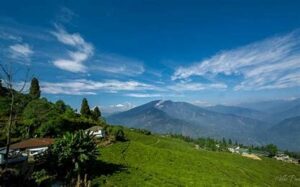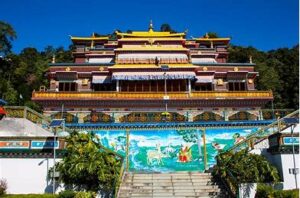Introduction: A Cultural Treasure in Manipur
Andro Village is a small but culturally rich settlement in Manipur, Northeast India. It is known for its unique pottery art, traditional houses, and age-old customs. The village is home to the Meitei community and preserves ancient practices that reflect a deep bond with nature, craft, and heritage.
This village stands as a symbol of traditional knowledge, where modernity hasn’t erased the roots of indigenous culture. Andro is not just a village; it is a living museum that continues to safeguard a way of life passed down through generations.
Historical Roots: A Village with Ancient Origins
The history of Andro goes back several centuries. It is believed that the people of this village have lived here since the early days of the Meitei civilization. The name “Andro” is thought to mean “village of the people who returned.”
Historically, Andro played an important role in preserving the cultural practices of the Meitei tribe, especially during times when external influences threatened native traditions. The elders of the village are considered keepers of old customs, oral stories, and rituals.
Language and Communication: The Voice of the Meitei People
The main language spoken in Andro is Meiteilon, also known as Manipuri. It is the most widely spoken language in Manipur. The people also understand Hindi and a little English.
Communication in the village is warm and community oriented. Oral storytelling, folk songs, and everyday conversations help preserve cultural knowledge. Language in Andro is more than words; it carries values, beliefs, and collective memory.
Festivals and Celebrations: Rituals of Gratitude
Festivals in Andro are closely tied to agriculture and nature. The most important festival celebrated here is Lai Haraoba. It is a traditional Meitei celebration that honors ancestral spirits and local deities.
During Lai Haraoba, villagers perform dances, songs, and rituals to show gratitude for the land’s blessings. Other seasonal festivals also involve offerings to forest and water spirits, reflecting the spiritual link between people and nature.
Arts, Crafts, and Music: Pottery That Speaks
Andro is famous for its unique pottery. Unlike modern pottery, the artisans here use traditional hand-molding techniques without a potter’s wheel. Clay is mixed with rice husk and shaped by hand. The pots are then sun-dried and baked in open fires.
These pots are used for cooking, storing water, and religious purposes. Each design has cultural meaning. Some represent fertility, others represent protection. Music in the village is folk-based, with instruments like the pena and drums playing during rituals and celebrations.
Cuisine and Culinary Traditions: Earthy Flavors of the Land
Food in Andro is simple, natural, and full of local flavors. The diet includes rice, vegetables, fish, and fermented food like ngari (fermented fish). Most food is steamed, boiled, or lightly fried.
Earthen pots made by local artisans are used for cooking, which adds a special flavor to the meals. Herbs and wild greens collected from nearby forests are common in daily cooking. Sharing food is a community value, especially during festivals and ceremonies.
Attire and Ornamentation: Weaving Identity
Traditional clothing in Andro reflects Meitei culture. Women wear a phanek, a type of wrap-around skirt, and an inaphi, a shawl. Men wear dhotis and traditional shirts during cultural events.
Jewelry is made from beads, silver, and brass. Designs often feature symbols from nature like birds, leaves, or rivers. Clothes and ornaments are not only decorative but also represent social identity and cultural pride.
Beliefs and Values: Harmony with the Ancestors
Andro villagers follow Sanamahism, the traditional Meitei religion. It teaches respect for nature, ancestors, and community life. People believe that natural elements like rivers, hills, and forests have spirits.
Rituals are performed to maintain harmony between the human world and the spirit world. Values such as honesty, hospitality, and cooperation guide everyday behavior. Elders are respected as knowledge keepers and decision-makers.
Customs and Etiquette: Rooted in Respect
Customs in Andro are simple but meaningful. Elders are always greeted with respect. Guests are treated with care and often offered food or tea.
During festivals and rituals, certain customs must be followed, such as offering first to the gods and ancestors before eating. Community members help one another during farming, house-building, or during times of need. This sense of togetherness forms the foundation of village life.
Architecture and Symbols: Houses that Tell Stories
One of the unique features of Andro is its traditional houses. Built using bamboo, mud, and thatch, these homes are eco-friendly and suited to the local climate. The layout of the houses reflects traditional Meitei architecture.
The village also has a cultural complex known as the Mutua Museum, where models of tribal homes from all across Manipur are preserved. Each house represents a different tribe, showcasing diverse architecture and lifestyles.
Oral Traditions and Storytelling: Wisdom in Words
Storytelling is an important part of life in Andro. Elders share folk tales, myths, and real-life stories with children and younger generations. These stories are usually about ancestors, nature, gods, and the village’s past.
Songs, riddles, and proverbs are also used to teach values, history, and social roles. This oral tradition keeps history alive, especially in a place where written records are few.
Interactions with Nature: Living with the Land
Nature is not just a backdrop in Andro; it is part of life. People grow their food, collect herbs, and use local materials for building. Water is drawn from nearby wells or streams. Fishing, farming, and pottery are all done in ways that do not harm the land.
The villagers believe that if you respect nature, it will take care of you. This belief guides how they use resources and interact with their surroundings.
Challenges and Preservation: Holding on to the Past
Like many traditional villages, Andro faces challenges. Young people often move to cities for better jobs. This leads to a decline in traditional knowledge and skills. Pottery-making is practiced by fewer families now.
Modern construction materials and lifestyles are slowly replacing traditional ways. Environmental changes also affect farming and water availability. However, some local groups and cultural organizations are working to preserve the village’s heritage through education and exhibitions.
Contributions to the Broader Region and World
Andro’s contributions go beyond its borders. Its pottery techniques, oral traditions, and ecological living methods offer valuable lessons in sustainability. Artists and researchers from outside the region study Andro’s crafts and traditions.
The village plays a role in keeping Meitei culture alive. It inspires interest in heritage preservation and traditional crafts not just in Manipur, but across Northeast India and beyond.
Connection to Northeast India: A Cultural Microcosm
Andro represents the heart of Manipur’s cultural diversity. Its traditions connect with those of other tribes and communities across Northeast India. The traditional homes displayed in the cultural complex reflect shared values like respect for nature, community life, and craftsmanship.
By preserving its identity, Andro helps Northeast India stay connected to its roots. It acts as a living classroom for those who want to learn about the region’s indigenous cultures.
Preserving the Spirit of Andro
Andro Village is more than just a place. It is a symbol of tradition, community, and creativity. With its pottery, traditional homes, and deep respect for nature, it reminds us of the importance of preserving cultural heritage.
As times change, the spirit of Andro continues to guide people who seek to live with balance, care, and wisdom.




